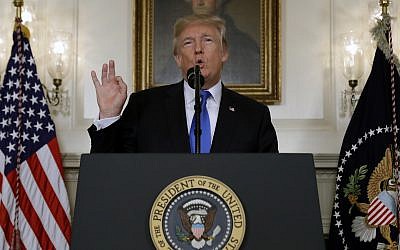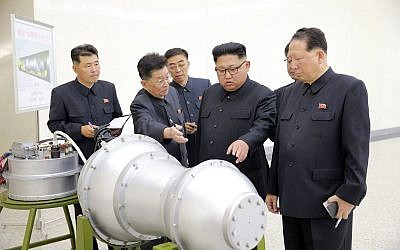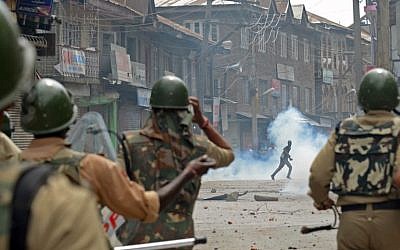PARIS — Dozens of experts and former senior officials from around the world met in the French capital last week to discuss the threat of nuclear proliferation, something they believe is ignored despite the dire situation and — according to some — worse than it was during the Cold War.
The Iran deal, the risk posed by North Korea and the ever-present potential that the two atomic powers India and Pakistan will go to war were deemed the most pressing threats at the 10th anniversary conference of the International Luxembourg Forum on Preventing Nuclear Catastrophe.
But they were not seen as the most dangerous. That distinction belonged to the deteriorating ties between United States and Russia, which possess more nuclear weapons than every other country combined, several times over. (The US and Russia each have approximately 7,000 warheads. France, with the next largest stockpile, has about 300, according to the Federation of American Scientists.)
The Luxembourg Forum, led by Russian Jewish magnate Viatcheslav Moshe Kantor, was founded a decade ago and meets each year in world capitals to discuss how best to advance its cause of nuclear disarmament. The group, made up of experts in the field of nuclear physics, diplomacy and security, met on October 9 and 10 in Paris’s Four Seasons hotel.
These experts — many of the former officials from the US, Russia, Israel, the UK and South Korea — warned that unlike during the Cold War, when the threat of nuclear war was immediate and apparent, world leaders and their constituents are less cognizant of the risk today and do not have the mechanisms in place to prevent such a conflict.
In particular, William Perry, who served as US secretary of defense under Bill Clinton and held a number of security-related positions in the decades prior, stressed that today there was a significant threat of nations “blundering” into nuclear war.
“Have we forgotten the Cuban missile crisis?” Perry rhetorically asked the conference.
The former defense secretary recalled a number of near misses between the US and Russia during the Cold War, when human or machine error nearly set off nuclear war.
We could have the same number of casualties as all of World War II, only these would happen in six hours instead of six yearsHe warned that today the same could happen again between the US and Russia, India and Pakistan, or North and South Korea.
“We could have the same number of casualties as all of World War II, only these would happen in six hours instead of six years,” he said.
Comments reportedly made by US President Donald Trump about dramatically increasing the number of nuclear weapons in the American arsenal also raised concerns about the status of the Treaty on the Non-Proliferation of Nuclear Weapons, a decades-old international agreement meant to curb the development, testing and use of nuclear bombs.
Yet the meeting in Paris was overshadowed by discussion over the Iran nuclear deal, officially known as the Joint Comprehensive Plan of Action, ahead of US President Donald Trump’s decision last Friday to not recertify it, a move that potentially imperils the agreement.

This recertification process is required by a provision in a 2015 US law according to which the president needs to inform Congress every three months if the Islamic Republic is adhering to the terms of the agreement in exchange for broad international relief from oil, trade and financial sanctions. By refusing to do so, Trump allows the US to pass new sanctions on Iran, though there have not yet been moves to do so.
The international forum was unanimously opposed to dissolving the deal, with some members acting thoroughly flabbergasted by the notion, seeing no value whatsoever in scrapping it.
“No one pays and all gain” from the JCPOA, said Hans Blix, the former director-general of the International Atomic Energy Association.
Tony Blair, who spoke on the first day of the conference, acknowledged that there was some legitimate criticism of the deal, but said the “sensible thing to do” was to uphold it.
Kantor, who is also president of the European Jewish Congress, similarly argued in favor of the agreement, saying that scrapping it would be “unforgivable.”
Trump says he believes that the US can renegotiate the deal to make it last longer and give the IAEA easier access to Iranian military sites. But not everyone shares that belief.
“It is a fallacy that a better agreement can be negotiated. It is a misunderstanding on the part of the president,” Perry said.
Speaking to The Times of Israel on the sidelines of the conference, former Israeli national security adviser Uzi Arad said that he suspects the overwhelming support for the deal is not necessarily because of its merits, but due to the drawn-out fight for it.
After such an extended battle for the JCPOA, its proponents now have to stand behind it fully, even if it’s not necessarily optimal, Arad said.
The ongoing spat between the United States and North Korea — or, more specifically, US President Donald Trump and North Korean dictator Kim Jong Un — was another frequent topic of conversation at the two-day conference.
Perry said he was “appalled” by the level of discourse between the two heads of state, with Trump derisively referring to Un as “rocket man,” and Un firing back by calling Trump a “dotard.”

There was general consensus that the tension between North Korea and the US needed to be resolved diplomatically, due to the tremendous potential cost of life that would come from a military exchange. There was, however, disagreement over what the terms and goals of these talks should be.
Some advocated an exchange in which North Korea would halt all nuclear and ballistic missile tests, after which the US would stop sanctions. But James Acton, of the Carnegie Endowment for International Peace, argued against this “all or nothing” approach in favor of a “less for less” model, under which Pyongyang would scale down its tests and military exercises and the US would decrease the sanctions proportionally.
Most of the attendees saw Beijing, North Korea’s main trading partner, as being the key to these negotiations.
Turn off the gas for three months, make it hurt. Then turn it back on, and they’ll come to the negotiating tableByungki Kim, a South Korean professor of international relations, said if China were to put pressure on the country, it would force them to enter talks with the United States.
“Turn off the gas for three months, make it hurt. Then turn it back on, and they’ll come to the negotiating table,” Kim told the Forum.
However, the lone Chinese representative — Zhenqiang Pan, an analyst with no official government — said that the general view in his country is that the conflict is between the US and North Korea so China does not have direct responsibility for it.
“China can be a mediator. It has some leverage [over North Korea], but it’s limited,” Pan said.

In India and Pakistan, two nuclear armed nations engaged in an extended, simmering conflict over territorial and ethnic disputes, the Luxembourg Forum saw the most feasible chance for atomic warfare.
The two countries have maintained tense relations for decades. This comes, in part, from both nations claiming the Kashmir region as their own, as well as from differences in the countries’ religions — Pakistan is majority Muslim, while India is majority Hindu.
Perry, the former US defense secretary, showed the forum a video that his foundation produced about a scenario in which the two countries fire atomic weapons at one another.
In the animated video, a group of Pakistani terrorists carry out an attack in India, prompting an Indian army retaliation. The military exchanges escalate quickly, culminating in the launching of nuclear weapons.
While the Forum was unanimous in identifying India and Pakistan as being likely locations of a future nuclear war, no specific proposals were made to disarm the two countries or resolve the conflict between them.
At the close of the conference, the delegates set to work writing a document with their proposals.
Once this document is prepared, it will be published by the Luxembourg Forum and the attendees are meant to present the findings to their home countries.

No comments:
Post a Comment